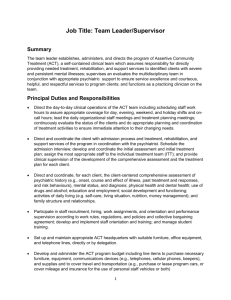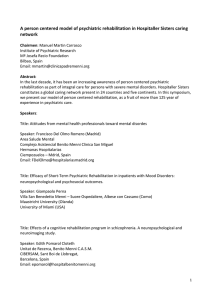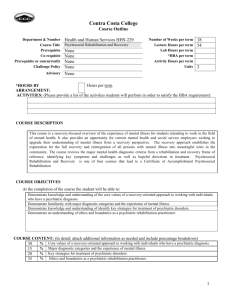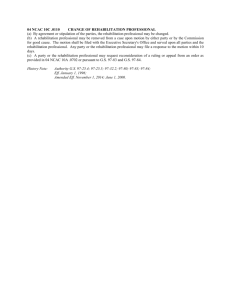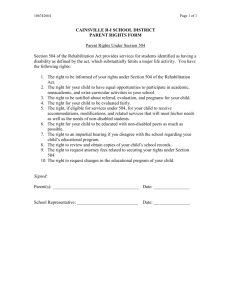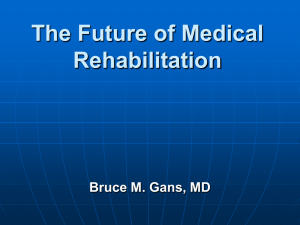2014 cprp exam blueprint - Psychiatric Rehabilitation Association
advertisement
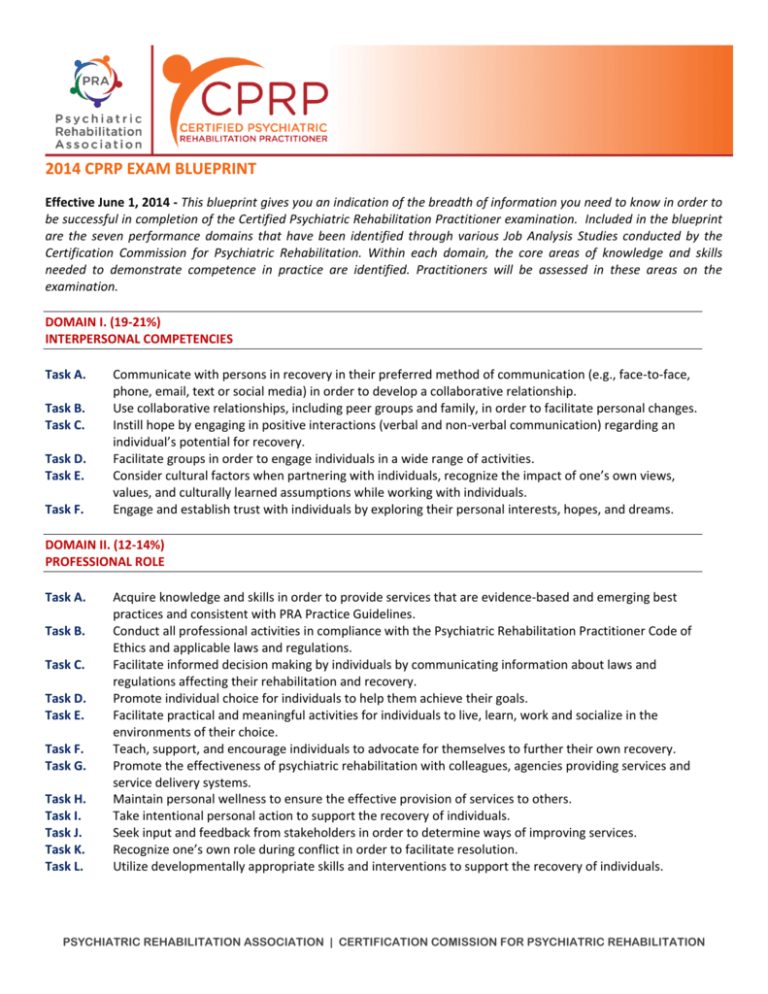
2014 CPRP EXAM BLUEPRINT Effective June 1, 2014 - This blueprint gives you an indication of the breadth of information you need to know in order to be successful in completion of the Certified Psychiatric Rehabilitation Practitioner examination. Included in the blueprint are the seven performance domains that have been identified through various Job Analysis Studies conducted by the Certification Commission for Psychiatric Rehabilitation. Within each domain, the core areas of knowledge and skills needed to demonstrate competence in practice are identified. Practitioners will be assessed in these areas on the examination. DOMAIN I. (19-21%) INTERPERSONAL COMPETENCIES Task A. Task B. Task C. Task D. Task E. Task F. Communicate with persons in recovery in their preferred method of communication (e.g., face-to-face, phone, email, text or social media) in order to develop a collaborative relationship. Use collaborative relationships, including peer groups and family, in order to facilitate personal changes. Instill hope by engaging in positive interactions (verbal and non-verbal communication) regarding an individual’s potential for recovery. Facilitate groups in order to engage individuals in a wide range of activities. Consider cultural factors when partnering with individuals, recognize the impact of one’s own views, values, and culturally learned assumptions while working with individuals. Engage and establish trust with individuals by exploring their personal interests, hopes, and dreams. DOMAIN II. (12-14%) PROFESSIONAL ROLE Task A. Task B. Task C. Task D. Task E. Task F. Task G. Task H. Task I. Task J. Task K. Task L. Acquire knowledge and skills in order to provide services that are evidence-based and emerging best practices and consistent with PRA Practice Guidelines. Conduct all professional activities in compliance with the Psychiatric Rehabilitation Practitioner Code of Ethics and applicable laws and regulations. Facilitate informed decision making by individuals by communicating information about laws and regulations affecting their rehabilitation and recovery. Promote individual choice for individuals to help them achieve their goals. Facilitate practical and meaningful activities for individuals to live, learn, work and socialize in the environments of their choice. Teach, support, and encourage individuals to advocate for themselves to further their own recovery. Promote the effectiveness of psychiatric rehabilitation with colleagues, agencies providing services and service delivery systems. Maintain personal wellness to ensure the effective provision of services to others. Take intentional personal action to support the recovery of individuals. Seek input and feedback from stakeholders in order to determine ways of improving services. Recognize one’s own role during conflict in order to facilitate resolution. Utilize developmentally appropriate skills and interventions to support the recovery of individuals. PSYCHIATRIC REHABILITATION ASSOCIATION | CERTIFICATION COMISSION FOR PSYCHIATRIC REHABILITATION DOMAIN III. (11-13%) COMMUNITY INTEGRATION Task A. Task B. Task C. Task D. Task E. Task F. Task G. Task H. Develop linkages with a wide range of community resources specific to meet the needs and goals of individuals. Link individuals to appropriate entitlement and benefit programs. Integrate community resources and entitlement programs into assessment, planning, and outcomes. Maximize the use of natural supports within the neighborhood and community. Challenge situations in the community that discriminate against persons living with severe mental illnesses. Connect individuals to legal and advocacy resources as needed and/or requested in order to promote selfadvocacy. Provide information on alternatives and complementary supports to traditional psychiatric treatment. Develop community resources to meet the needs of individuals receiving services. DOMAIN IV. (17-19%) ASSESSMENT, PLANNING, AND OUTCOMES Task A. Task B. Task C. Task D. Task E. Task F. Task G. Task H. Assist individuals in identifying personal priorities, preferences, strengths, and interests in order to help them establish goals that are consistent with their worldview. Perform assessments across multiple life domains in order to identify strengths, supports, and barriers. Collaborate with individuals to help them identify their personal preferences for dealing with crises. Collaborate with individuals to establish goals with specific, measurable, time-framed action steps in order to develop effective rehabilitation plans. Educate individuals on service options in order for them to choose the appropriate types and levels of service and/or community supports. Identify, assess and plan opportunities that empower individuals to transition from professional provider services to natural community supports. Regularly evaluate and modify the rehabilitation plan with the service recipient based on his/her progress toward rehabilitation plan goal(s). Use assessment and planning techniques that support inclusion of individuals from diverse backgrounds that comprise the demographics of the community where services are provided. DOMAIN V. (14-16%) STRATEGIES FOR FACILITATING RECOVERY Task A. Task B. Task C. Task D. Task E. Task F. Utilize a variety of alternative approaches to engage individuals. Facilitate and encourage skill building, self-discovery, and learning across all life domains to assist individuals in achieving their goals. Assist individuals in identifying and developing strategies for relapse prevention for mental and physical health. Use individualized outreach techniques in order to engage individuals in interventions. Employ crisis intervention strategies as needed. Assist individuals in modifying their living, learning, working, and social environments to enhance recovery. PSYCHIATRIC REHABILITATION ASSOCIATION | CERTIFICATION COMISSION FOR PSYCHIATRIC REHABILITATION Task G. Task H. Task I. Task J. Use motivational enhancement and readiness development strategies to initiate and/or sustain the recovery process. Educate and/or provide access to education on issues related to psychiatric disabilities wellness and recovery. Provide best-practice approaches to services, including evidenced-based practices, which help persons receiving psychiatric rehabilitation services achieve their goals. Promote the integration and inclusion of all individuals in social, civic, and community activities that will help them achieve their goals. DOMAIN VI. (9-11%) SYSTEMS COMPETENCIES Task A. Task B. Task C. Task D. Task E. Task F. Task G. Combat stigma, oppression, discrimination, and prejudice in all forms, directed against persons living with severe mental illnesses. Advocate for improved access, inclusion and integration with public services and resources and integration to facilitate an individual’s recovery, improved quality of life and full community integration. Advocate for system changes to make services responsive to the needs of persons receiving psychiatric rehabilitation services. Assist individuals in their use of other service systems to meet their personal goals. Encourage and support the development of peer services and leaders among persons receiving psychiatric rehabilitation services. Advocate for effective services that are welcoming to persons from all cultural backgrounds. Advocate for service utilization consistent with community demographics. DOMAIN VII. (11-13%) SUPPORTING HEALTH & WELLNESS Task A. Task B. Task C. Task D. Task E. Assist individuals in identifying and accessing specialized services. Assist individuals in identifying and developing strategies for improving various dimensions of wellness. Support individuals in developing the knowledge, skills, and attitudes necessary to maintain his or her health and wellness. Promote the importance of mind, body and spirit connections, the need for satisfactions and valued purposes, and a view of wellness as more than non-illness. Assist individuals in developing and sustaining a wellness lifestyle. PSYCHIATRIC REHABILITATION ASSOCIATION | CERTIFICATION COMISSION FOR PSYCHIATRIC REHABILITATION
